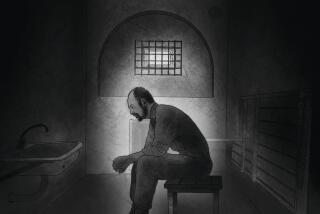Soviets Mainly Cooperative in Probe of Mental Hospitals, U.S. Team Says
- Share via
MOSCOW — A group of American psychiatrists who spent two weeks trying to determine if the Soviet Union has stopped incarcerating dissidents in mental hospitals said Saturday that Soviet officials tried to discourage some patients from talking to them and were slow to produce medical records.
But they praised their Soviet hosts for permitting free access to the hospitals they wanted to tour, and a delegation leader called the visit “definitely a step forward in our mutual relations.”
Delegates refused to discuss any of the findings reached in their unprecedented investigation into the status of mental health care in the Soviet Union. They said they would complete their report in four to six weeks, give the Soviets a chance to reply in writing and then publicly release both their conclusions and the Soviet response at the same time.
A Soviet Foreign Ministry official, meanwhile, said the Soviet psychiatric system had been reformed and that political dissidents were not being forced into mental hospitals.
This year, the Soviets freed about 10 mental patients whose cases had raised controversy in the West and whom the doctors had planned to visit in psychiatric hospitals, according to a delegation source. He declined to name the patients.
Problem Said to Remain
But a Soviet man who was once jailed for complaining publicly about the abuse of psychiatry in the Soviet Union told reporters Saturday that the problem remains.
“Political prisoners remain in psychiatric hospitals to this day. New ones are being added to their number,” Alexander Podrabinek, editor of the underground weekly Express Chronicle, told reporters gathered in a Moscow apartment. “We know of several cases in the last few months.”
The Soviet Union has long been accused of silencing political dissidents by putting them into mental hospitals. In 1983 it withdrew from the World Psychiatric Assn. rather than be kicked out for allegedly involuntarily hospitalizing dissidents.
But Moscow has applied for readmittance, and the report from the American delegation is likely to be carefully studied when the international organization considers the Soviet application during a session later this year.
The 26-member American group consisted primarily of psychiatrists but was headed by a State Department official, a signal that the doctors’ visit was seen in the context of American-Soviet political relations.
Team Interviewed 27
Dr. Loren H. Roth, the leading psychiatrist in the delegation, told a news conference that during a two-week visit, the doctors had interviewed 27 patients or former patients and visited four mental hospitals outside Moscow. He said the Soviets had abided by agreements reached earlier with the American doctors “in most, but not in all, areas.”
“We did receive the patient records very late,” said Roth, of the University of Pittsburgh’s Law and Psychiatry program.
“They were not always complete, and in some instances we are still photocopying them. I do recognize there were many technical difficulties here, but this did slow down the work. That is one of the reasons why we cannot reach conclusions, since it will be necessary over the next month for us to review those materials.”
In addition, Roth said: “In a few instances, patients who we eventually did interview were discouraged by the Soviets from the interview, and we had to overcome some obstacles to obtain these interviews at all.”
Roth declined to elaborate. He added that a few patients declined to be interviewed by the American team, and said in most cases, the Americans spoke to the patients personally to confirm those refusals. Patients who declined to meet the Americans did so primarily because they felt their mental health care was good, according to delegation sources.
Despite the difficulties, Roth said, “this is definitely a step forward in our mutual relations.’
“We will not deny that this has been a very sensitive and difficult undertaking to carry out to the full of our satisfaction,” added delegation leader Robert W. Farrand of the State Department’s Bureau of Human Rights and Humanitarian Affairs. “Clearly, however, without the expressed commitment of the Soviet government, this effort would not have been possible at all.”
A Soviet Foreign Ministry spokesman, Yuri A. Reshekov, told the same news conference that the Soviets had acted as quickly as possible without much advance notice to meet the specific requests of the American doctors.
“One of the regions they wanted to visit, the Chernyakhovsk region, is usually closed to foreigners,” said Reshekov, head of the ministry’s Department for International Cooperation and Humanitarian Affairs. He noted that while it is normally a lengthy process for a foreigner to receive permission to visit that area, “it was, in this case, settled in just a few minutes.”
“As far as patients’ records were concerned, I do agree there were difficulties, because the record of one mental patient can reach as high as a man,” Reshekov said. “In addition, there were situations when patients who initially agreed (to be interviewed) later changed their minds, and that led to some difficulties.”
‘We Did Everything Possible’
But he added, “We did everything possible to ensure the best conditions for the visit of the American psychiatrists . . . and to meet all their requests.”
In response to a question, he said a number of areas of Soviet society had been reformed since Mikhail S. Gorbachev became Communist Party leader in 1985, and “psychiatry was one of the first areas where the rules of a civilized, law-based approach to a certain category of the population began to be restored.”
He noted that a 1988 decree makes it a crime to involuntarily hospitalize a sane person.
“In the Soviet Union we do not have political prisoners, or those who are interned due to their religious or political views,” Reshekov said. “I can say the same thing concerning the state of our psychiatric institutions.”
More to Read
Sign up for Essential California
The most important California stories and recommendations in your inbox every morning.
You may occasionally receive promotional content from the Los Angeles Times.













